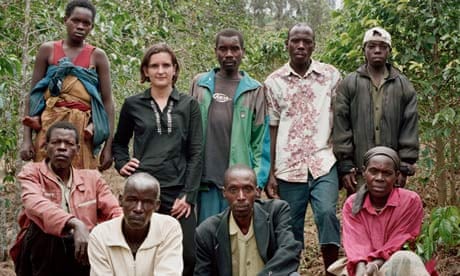'Focus on the concrete steps we can take now'
ABHIJIT BANERJEE AND ESTHER DUFLO
Professors of economics at Massachusetts Institute of Technology and co-authors of Poor Economics, which won the Financial Times and Goldman Sachs business book of the year award in 2011
The goal of ending poverty is elusive, and those in the aid business seem to oscillate between giddiness and despair, between the excitement of the latest miracle cure and accusations of failure or worse. As the critics never fail to point out, billions of dollars have been spent on aid but the poor are still with us.
There is no one thing that can end poverty. And certainly no one thing that is within the capacity of you, or us, or any particular person or institution. The fight against poverty is not a crusade, with a well-identified and specific enemy, be it unbridled capitalism, rogue governments, over-regulation, hunger or malaria. All of these probably have something to do with the persistence of poverty. But none are easy to fix and, more importantly, even if they were fixed, poverty would still be with us.
Fighting poverty is to fight, with patience and deliberateness, the many problems that make the lives of poor people difficult: bad schools, dirty water, infectious diseases, the vagaries of weather and other natural disasters, poor sanitation, lack of skills, petty corruption, potholes, etc. The list goes on.
These problems are concrete but hardly glamorous, possible to solve, but often without a known solution. No one person can solve all of them and, in any case, getting them all fixed will not end poverty tomorrow and maybe not even in 50 years. But if we could give up the lofty goals and empty promises, and focus all our energies on the concrete steps we are able to take here and now to improve the lives of the poor worldwide, we would at the very least bring some real comfort to the lives of many millions.
And perhaps out of all that, in some unexpected corner of some unheralded economy (after all, who in 1979 thought the world economy one day would rise and fall with growth in China?), there will be a spark that will make the entire economy catch fire, unleashing the growth that will eventually end poverty as we know it.
'Ensure the market works more efficiently'
DAMBISA MOYO

Economist and author whose books include the New York Times bestseller Winner Take All
In Obama's inaugural speech in 2009, he noted: "Nor is the question before us whether the market is a force for good or ill. Its power to generate wealth and expand freedom is unmatched." I agree.
History has shown us that if it works correctly, only a market-based system, no other, is able on a consistent basis to deliver economic growth and put a meaningful dent in poverty. In this regard, I believe that we should dedicate our time, efforts and policy-making to the removal of barriers, including corruption, cronyism, opaque processes and subsidies, that prevent capitalistic mechanisms from working.
Combating the ills that undermine the efficient workings of a market economy is essential to transforming a country from desperately poor to an economic powerhouse that meaningfully reduces poverty. Furthermore, a properly working economic system, without the deadweight losses associated with these barriers, drives substantial investment in education, healthcare and infrastructure, all of which reduce poverty.
Such a system does not exist at present, as virtually every nation is guilty of perpetuating these ills, albeit to varying degrees. The use of multibillion dollar farm subsidies in the US and Europe, which hurt poor, agricultural-based countries, and pervasive corruption and cronyism, which hamper growth and prove distortional in developing and developed economies alike, are just some of the barriers that limit trade and hinder investment and capital flows and thus ensure that poverty persists across the world. Thus, in the absence of these barriers economies will flourish and poverty will be banished.
'Support charities that make people mobile'
JOHN BIRD

Founder of the Big Issue and author of The Necessity of Poverty, published in December by Quartet Books
Capital created the working class. It also created the workless class. Once, capital needed workers to work its mills and factories. But 200 years later, many of them needed to be laid off. It needed the quick movement of capital into countries with cheaper labour and into new technologies: cheaper coal, containerisation rather than dockers. Capital needed governments that would "buy off" these abandoned workers. So they modified the benefit system to warehouse them, the great unneeded, turning Britain into, among other things, a land of abandoned communities, abandoned families, abandoned factories and abandoned opportunity.
The morale of millions was atomised. The skills and solidarity of their forefathers, honed in colliery, factory and mill, were lost. Warehoused, these new poor became the butt of every moraliser and do-gooder, and each politician declared they would rescue or drive out these people from their failed lives.
For welfare to work, it has to be seen as a springboard, not a concrete safety net. You have to fare well on welfare in order to say farewell to welfare.
The one thing that would bring poverty to its knees would be the reinvention of the welfare state so that work once more became central to wellbeing. Investing in education and communities would help overturn more than 30 years of social reversal and end the separation of the poorest among us into ghettos of need.
Make sure that work skills, education and social training are increased while on welfare, not diminished. Celebrate those who have escaped benefit and poverty so that others can be encouraged by their example. Support the charities and projects that get people mobile rather than just holding their hands and commiserating with their plight. Remove the able-bodied from the benefit equation so that those who are less capable can have more done for them. And free people up so that they do not suffer the human rights abuse that is the reality of poverty.
'Redistribute resources of the richest countries'
FRANCES STEWART

Professor emeritus, Oxford Department of International Development
Poverty can be eliminated. Essentially, what is needed is a significant reduction in the quite obscene levels of inequality that prevail today. These inequalities are to be found between nations and within them. The average incomes of high-income countries (in Europe, North America and Japan) are more than 70 times the average income of low-income countries. Redistribution of 10% of the incomes of the richest countries would increase the incomes of the poor group of countries by more than ninefold per head, clearly providing poor countries with enough resources to eliminate poverty.
Moreover, within both rich and poor countries, poverty is perpetuated by inequalities between classes, among wage and salary earners, by gender, and between ethnic and racial groups. A fairly modest redistribution of resources from the privileged to the deprived would be enough to eliminate poverty in high- and middle-income countries. Such a redistribution should not consist just of a cash transfer (though obviously this would help), but should include redistribution of resources to improve the health, the education, the assets and the productivity of the poor so that the improvement in their lives can become self-sustaining.
A range of policies is known to be effective in reducing inequality and eliminating poverty – land redistribution, cash transfers, food subsidies, employment and credit schemes and minimum wages, among others. It is not knowledge but the decision to introduce them comprehensively and generously that is needed. If every country could reduce their inequalities to those experienced, for example, by Sweden, this would be sufficient to eliminate poverty and to create conditions for truly inclusive growth. Yet unfortunately, as a result of the way the global economy is organised, inequality is not falling but rising in most countries today.
'Monitor developments using real-time data'
JEFFREY SACHS

American economist and director of the Earth Institute at Columbia University
The end of extreme poverty is in sight and feasible by 2025 to 2030. Success in this fight will require the application of advanced technologies (information, communications, transport, agronomy, genomics, materials science, among others), management and a mix of private markets and public initiatives. The millennium development goals have helped tremendously. The next set of goals making up the post-2015 agenda can help to complete the job.
From the point of view of development practice, the most important single step will be to develop rich and reliable information systems that use (nearly) real-time data on vital events, disease incidence, school attendance, crop performance and other factors to monitor developments. In the public sector, fighting poverty is increasingly a public management challenge. Health and education systems need to deliver real services in real time. Infrastructure – safe water, sanitation, roads and power – needs to function and to be repaired when broken. Smart subsidies (eg for agricultural inputs) or lifeline tariffs (for water and power) need smart metering and pricing strategies. All of this depends on quality information and feedback from data into revised actions.
There are now more than 400 million mobile subscribers in Africa and this information revolution has brought breakthroughs in mobile services such as banking and community-based health delivery. The current GSM networks will be 3G or higher in the next few years. This step up will make possible a far higher level of reliability and sophistication of services and data collection and processing. E-education, e-government, e-health, e-banking and e-agriculture will all play their role.
The information revolution will also make possible the introduction of smart grids in poor countries even ahead of the more complex incumbent systems in rich countries, with time-of-day pricing for solar power and other highly effective ways to cut costs through smart energy delivery. We are now introducing smart metering for water and other services as well, all made possible by breakthroughs in information technology, metering and systems design.
A key weakness of the international millennium development goal process was the lack of timely data. The development community has traditionally lived on the processing of household surveys typically with a several year lag. This time lag, where data on mortality rates, school attendance and the like is several years old by the time it is released, is unacceptable and unworkable and, most importantly, no longer necessary. We need data not for reports but for management. Data that is two or three years out of date by the time it arrives is nearly useless for management, at least if we take seriously our objectives to end poverty. With timely and reliable data, public management can be greatly strengthened and public agencies, within the countries and globally, can be better held accountable for their parts of the development puzzle.
'Big companies could donate surplus goods'
CAMILA BATMANGHELIDJH

Founder of Kids Company
Child poverty remains a national challenge. In London, it is thought that four in 10 children live in poverty, though the capital houses the headquarters of more than 100 of Europe's 500 largest companies, generating one of the largest economies of the world.
Families living in poverty usually have only £10 per person per day to fund their basic needs, including gas, electricity, food, travel, TV licence, clothes and toiletries. Many children lack a winter coat. This want of basic resources, set against a backdrop of cultural abundance, makes children feel profoundly humiliated. We need to see this issue not only in terms of fundamental human rights, but also in terms of neurodevelopment. Children living in chronically distressed households, deprived of any positive stimulation, are being psychologically, as well as biologically, damaged.
The current government is focusing its distribution of state benefits on forcing parents to take jobs. If the parent fails to gain employment and benefits are withdrawn as a sanction, the most adversely impacted will, yet again, be the children, who become pawns in the power play between government and the perceived "workshy". With housing benefit capped and politicians suggesting under-35s remain at home with their parents if they can't afford independent living, families are being significantly endangered. What happens to the young person being maltreated at home if they can't leave?
The propensity to be judgmental about poverty is blinding us to the potential solutions within our grasp. Our tendency to perceive poverty as a by-product of, say, addiction, stupidity or laziness, shifts society's focus on to producing prolific theoretical and explanatory reports, while practical, immediate, solution-focused interventions are rarely considered.Why not set up "exchange stations" within local authorities? Wealthy companies and individuals donate their surplus goods, which are then redistributed to those in need. All restaurants and food outlets could donate surplus food to the local authority dining room, where the most disadvantaged turn up for meals or takeaway boxes of food. Through specialist membership schemes, the poorest families could have low-cost or free gas, electric and TV licence access. Schools could be given specialist budgets to tackle poor children's basic needs.
A poor child doesn't lie in bed wondering which policy paper is going to best meet their needs. They require immediate and practical interventions to soothe their rumbling bellies and burning shame.
'Empower people by giving them the facts'
JAMIE DRUMMOND

Co-founder and executive director of One, which fights extreme poverty and preventable disease in Africa
If more people became evidence-based activists and looked at the raw data about what actually works in the fight against extreme poverty, and what doesn't, and campaigned to scale up what works, then we would help beat back poverty far faster than we are today.
So let me give a supremely dull answer: invest in far better open data systems. Give people the facts and they'll do the right thing. Some of the facts we need to know are – what do poor people really think are the priorities in their lives, when asked? The development bunch rarely asks that question. If polled, what people say is, I want a decent job or I want to not have to pay the corrupt policeman on the corner a bribe today. Then if the international community worked to tackle the things the poorest actually say are their real everyday concerns, that could be transformative.
The open data that matters to the poor also includes things like: how much is the local government supposed to spend on schools or healthcare or infrastructure? If they know this they can see whether that money is actually getting through. If the poorest were armed with this information it would be vastly and practically empowering. It's a bit scandalous this is not a greater focus already of development. We need to get with the times – mobile telephony has accelerated the ability of even the most marginalised to access data.
Open data can empower people here in the UK also. When One and ComRes asked the British public how much will be spent on aid next year, more than 60% overestimated the amount by some distance, with a quarter estimating it to be between 5% and 20% of total government spending. It is just over 1%. And they think it achieves nothing because that's what the Daily Mail spends a lot of money trying to tell people. In fact, smart aid has helped save 5.5 million kids' lives through vaccines, by halving malarial deaths in eight countries in Africa and increasing the number of people on lifesaving anti-Aids medicines from 50,000 to 6.2 million, and by increasing education enrolment by 50 million in sub-Saharan Africa alone. These kinds of facts are impressive and empowering, but scandalously nobody knows them.
So if you want to do one thing, then fight for free facts and get that into the hands and heads of those who will fight for the poorest, or, better still, get the facts into the hands of the poor and they'll fight their way out of that state of injustice called extreme poverty.
'A good education has to be available to all'
LORD BOATENG

Former Labour MP and high commissioner to South Africa, he serves on the board of Food for the Hungry
Poverty has more than one cause, so no single easy answer presents itself. Nevertheless, as a child growing up in newly independent Ghana in the early 60s, and as a black boy parachuted into a council estate in West Herts in the aftermath of a coup d'etat at home several years later, one answer always seemed relevant to me. The way forward to a brave new world free from the ever-present fear of poverty was signposted by education.
Now in my 60s, with a lifetime in the law, politics and diplomacy behind me, equal access for all to a good education still seems to me to be the best starting point in the fight against poverty. Cultural oppression, global imbalances in human and technological capacity and structural injustice are all challenged by education. And not just primary education, which, in recent decades, has all too often been seen as a goal in itself. My paternal grandfather was illiterate but wise enough to prioritise higher education for all his children regardless of gender.
He was also a skilled enough farmer to know that maximising the yield and quality of his cocoa meant embracing change prompted by the nearby West African Cocoa Research Institute. Africa's R&D capacity is now unsustainably low. Agriculture and higher education have been neglected, including by our own Department for International Development, with disastrous consequences that threaten progress on a continent containing 60% of the world's remaining unused arable land as well as its most youthful population and its fastest-growing potential market.
The early 20th-century African educator James Emman Kwegyir Aggreycorrect put an emphasis on supplementing the 3Rs with the 3Hs, a holistic education with a place for the head (wisdom), the hand (practical delivery) and the heart (the life of the spirit). That prescription is still relevant today, not just to Africa and the next-generation millennium development goals, but to the complex forms of poverty, not least of aspiration, that afflict so many closer to home.
'Equalise life chances in the pre-school years'
FRANK FIELD

Labour MP for Birkenhead and the government's poverty tsar
As pupils reach the end of their school lives, poorer children are generally outperformed by their richer peers. Horrifyingly, this gap in attainment is not only present throughout the whole 12 years of school, but emerges after as little as 22 months of life. In a way, this makes sense as later attainment tends to be heavily influenced by early development: a building is only as sound as its foundations.
Poorer children therefore grow up to become poor adults; an intergenerational cycle of poverty is the result.
The best anti-poverty strategy we can therefore employ must centre on equalising life's chances in those crucial early years before children go to school. Our efforts must focus on ensuring the gap in outcomes does not even emerge. Only then will poorer children enjoy the same life chances as their richer peers. How can this be achieved?
Parents play the most significant role in influencing their children's futures. A combination of positive parenting and a good home learning environment can transform children's life chances. Parents should therefore be supported by the state and community to ensure they have the capacity to bring about such transformations. Support, naturally, needs to build first on parents' strengths.
More information at whypoverty.net



Comments (…)
Sign in or create your Guardian account to join the discussion